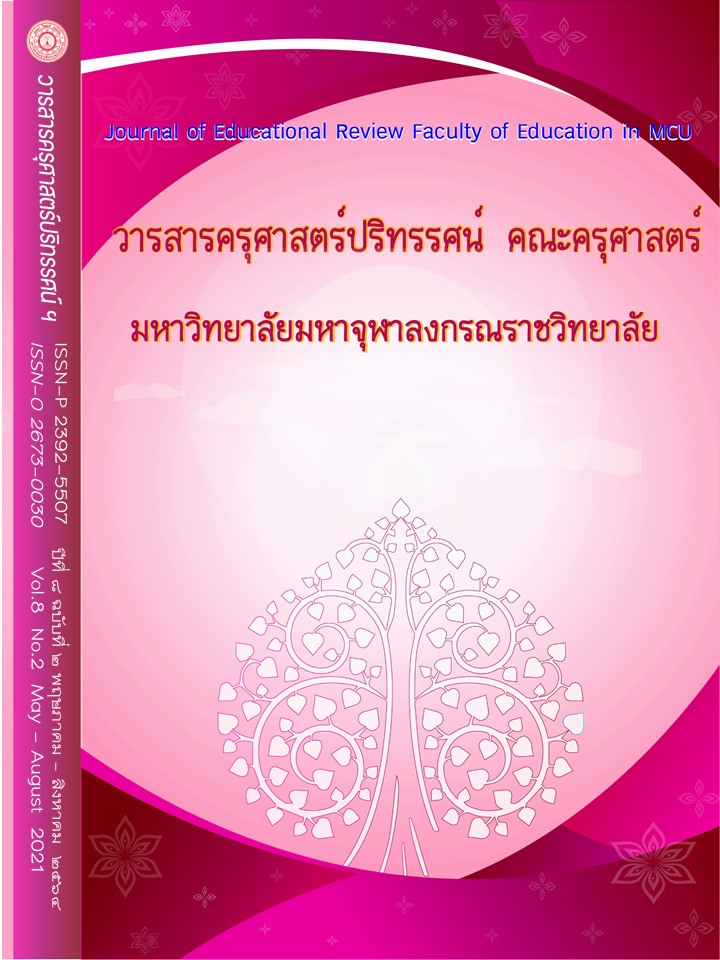A STUDY OF THE DIFFERENCES BETWEEN THE GASTROESOPHAGEAL REFLUX DISEASE TREATMENT OF MODERN MEDICINE AND THAT OF THAI TRADITIONAL MEDICINE
Main Article Content
Abstract
The purposes of this research were to compare the differences on its definitions, symptom, causes and treatment principles between modern medicine and Thai Traditional Medicine that is a qualitative research by document analysis and focus group discussion. The results showed that Gastroesophageal Reflux Disease (GERD) in modern medicine is a condition in which gastric contents flow up into the esophagus, causing irritation. There is a burning sensation on the top of the chest and belching due to erectile dysfunction of the esophageal sphincter. This causes the sphincter not to close completely, causing the gastric juice in the stomach to flow up to the esophagus. In principle, the treatment focuses on reducing stomach acid by taking antacid drugs. A sphincter repair surgery uses radiotherapy to tighten the sphincter. Its definitions and symptoms are close to these of Krasaiton disease in Thai traditional medicine. They differ only in explaining the causes and principles of treatment because Thai traditional medicine believes that it is caused by exacerbation of wind pushing the upper sphincter of the stomach open causing gastric juice to flow back into the esophagus. Therefore, the principles of drug therapy that contain hot flavored drugs properties help to dissolve the wind and astringent or bitter medicine properties help quench hot poison and heal wounds. The benefits of this research have been known of Thai traditional medical diseases clearly academic and can be used in teaching and learning processes to create potential graduates of Thai traditional medicine as well as being able to be an alternative to providing health care for people.
Article Details
ทัศนะและความคิดเห็นที่ปรากฏในบทความในวารสารฉบับนี้ถือเป็นความรับผิดชอบของผู้เขียนบทความนั้นเพียงผู้เดียว และไม่ถือเป็นทัศนะและความรับผิดชอบของกองบรรณาธิการ
กองบรรณาธิการขอสงวนสิทธิ์ในการคัดเลือกบทความลงตีพิมพ์และจะแจ้งให้เจ้าของบทความทราบหลังจากผู้ประเมินบทความตรวจอ่านบทความแล้ว
ต้นฉบับที่ได้รับการตีพิมพ์ในวารสารครุศาสตร์ปริทรรศน์ คณะครุศาสตร์ มหาวิทยาลัยมหาจุฬาลงกรณราชวิทยาลัย ถือเป็นกรรมสิทธิ์ของคณะครุศาสตร์ มหาวิทยาลัยมหาจุฬาลงกรณราชวิทยาลัย ห้ามนำข้อความทั้งหมดหรือบางส่วนไปพิมพ์ซ้ำ เว้นเสียแต่ว่าจะได้รับอนุญาตจากมหาวิทยาลัยฯ เป็นลายลักษณ์อักษร
References
กรมศิลปากร. (2542). ตำราเวชศาสตร์ฉบับหลวง รัชกาลที่ 5 เล่ม 1. กรุงเทพมหานคร: อมรินทร์พริ้นติ้งแอนด์พับลิชชิ่ง.
กรมศิลปากร. (2542). ตำราเวชศาสตร์ฉบับหลวง รัชกาลที่ 5 เล่ม 2. กรุงเทพมหานคร: อมรินทร์พริ้นติ้งแอนด์พับลิชชิ่ง.
กรมศิลปากร. (2542). ตำราเวชศาสตร์ฉบับหลวง รัชกาลที่ 5 เล่ม 3. กรุงเทพมหานคร: อมรินทร์พริ้นติ้งแอนด์พับลิชชิ่ง.
กรมสนับสนุนบริการสุขภาพ กองการประกอบโรคศิลปะ. (2549). ตำราแพทย์แผนโบราณทั่วไป สาขาเวชกรรม เล่ม 1. นนทบุรี: ไทภูมิ พับลิชชิ่ง.
กรมสนับสนุนบริการสุขภาพ กองการประกอบโรคศิลปะ. (2549). ตำราแพทย์แผนโบราณทั่วไป สาขาเวชกรรม เล่ม 2. นนทบุรี: ไทภูมิพับลิชชิ่ง.
นิตยา นามวิเศษ. (2555). การวิเคราะห์ผลการรักษาโรคเกี่ยวกับกระเพาะอาหารโดยกระบวนการรักษาด้วยตำรับยาคุมธาตุ. วิทยานิพนธ์การแพทย์แผนไทยมหาบัณฑิต. มหาวิทยาลัยราชภัฏเชียงราย.
ปารยะ อาศนะเสน. (2552). โรคกรดไหลย้อน (Gastroesophageal Reflux Disease: GERD). แหล่งที่มา http://www.rcot.org/2016/People/Detail/14 สืบค้นเมื่อ 28 พ.ย. 2563.
พระยาพิศณุประสาทเวช. (2450). ตำราแพทย์ศาสตร์สงเคราะห์ เล่ม 2. กรุงเทพมหานคร: โรงพิมพ์ศุภการจำรูญถนนอัษฎางค์.
พระยาพิศณุประสาทเวช. (2450). แพทย์ศาสตร์สงเคราะห์ เล่ม 1. กรุงเทพมหานคร: โรงพิมพ์ศุภการจำรูญถนนอัษฎางค์.
มูลนิธิสาธารณสุขกับการพัฒนา. (2559). ตำราการนวดไทย เล่ม 1. พิมพ์ครั้งที่ 5. สมุทรสาคร: พิมพ์ดี.
ศิริวรรณ เกตุเพชร. (2558). การศึกษาสมุฏฐานและหลักการรักษาโรคตามหลักทฤษฎีธาตุของพุทธศาสตร์กรณีศึกษาโรคกระเพาะอาหารเรื้อรัง. วิทยานิพนธ์การแพทย์แผนไทยมหาบัณฑิต. มหาวิทยาลัยราชภัฏเชียงราย.
สมาคมประสาททางเดินอาหารและการเคลื่อนไหว. (2563). แนวทางเวชปฏิบัติการดูแลรักษาผู้ป่วยโรคกรดไหลย้อนในประเทศไทย พ.ศ. 2563. กรุงเทพมหานคร: พริ้นท์เอเบิ้ล.
สุรเกียรติ อาชานานุภาพ. (2553). ตำราการตรวจรักษาโรคทั่วไป 2 350 โรคการดูแลรักษาและการป้องกัน. พิมพ์ครั้งที่ 5. กรุงเทพมหานคร: โฮลิสติกพับลิชชิ่ง.


